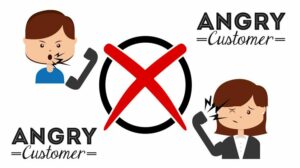When your customer starts screaming, what can you do to cope? Gemma Gibson reckons the answer lies in common sense, individual treatment, some understanding and a little tender loving care.
We all have our own strategies for dealing with angry customers. We may even have been an angry customer ourselves once or twice; I know I have. Indeed, our memories serve us well in dealing with this type of call. Some of them will have had successful outcomes in your mind, some might have been disastrous.
When receiving calls from irate customers, depending on our experiences and our skill level, we will instantly be put in a frame of mind that is either helpful for us to deal with the call or will hinder us from seeing things from both points of view and looking for the best possible solution for all. The tips and techniques in this article, if you choose to use them, will enable you to programme yourself to have a helpful frame of mind whenever these types of calls arise.
First up, angry customers don’t always follow the stereotypical behaviours of a raised voice, shouting, blaming you for their situation or demanding more than is reasonable. In fact, these are the easy ones to deal with as they will always calm down eventually.
Remember, though, that anger can manifest itself in other ways. Someone who is angry is capable of behaving calmly and being rational. They might be careful with their choice of words and they might listen very closely to what you say before attempting to twist it in their favour. Alternatively, they might be completely dismissive of what you are saying to them and possibly appear to know more than you do about the subject and/or claim to ‘know people in high places’.
Although we use the term ‘angry’ or ‘difficult’ when talking about these customers, let’s begin by understanding the reasons why they are angry. Are they calling because something has happened to them already? Are they getting angrier or is their behaviour changing as they talk with you? Think about yourself when you are an angry customer. What are your reasons for being angry? I’m sure, in your mind, these reasons are completely justified – just as they will be in your customer’s mind.
Why customers get angry in the first place
In my experience, most people ringing call centres when already angry have had something happen to them: something unexpected to their situation. This ‘something’ will have caused them unhappiness, uncertainty or inconvenience.
Customers who get angry while they are on the telephone, meanwhile, can often do so due to poor service, poor communication, lack of understanding of why things happen this way and, ultimately, because of frustration.
So do these customers have a right to be angry? Yes, they probably do in most cases. I’m not saying they have a right to be rude or obnoxious or to swear at you. However, once we are able to focus our thinking and empathise with customers by understanding the possible reasons why they might be angry, we can then consider what it is they are looking for from us and adapt the way we respond to them and take back control of the situation to the benefit of everybody.
So ask yourself: what has happened to this customer to make them angry? Find out all the facts by asking ‘what’ questions. Additionally, clarify anything that you are uncertain about to get a clear picture of events.
Other than that, you need to consider what it is they are looking for when they call. Reassurance? An apology? Compensation? Ask the customer what they see as a successful outcome to their situation. They might tell you they just want it sorted or they might be demanding the earth.
You have the opportunity now to either meet their needs exactly or to manage their expectations. In either case, both parties will at least be aware of what will be a successful ending and you can relax knowing that you have agreement from the customer as to what degree you can resolve the matter.
If a customer gets angry while on the phone to you, you have to look at your communication skills to determine reasons for their change in behaviour. Remember, it is quite possibly a lack of understanding by the customer that has led to their frustration, which in turn has led to them changing their tactic. Ask yourself what language you are using. How much personal responsibility are you demonstrating for resolving the problem for the customer?
In all cases, follow these practical steps:
- Be clear in your communication. Use straightforward explanations of policies, processes or ‘the way things are’.
- Be flexible wherever possible. Policies are there for consistency, fairness and working practices, and most are there for the benefit of the customer. See it from their point of view rather than being a stickler for rules.
- Use solution-focused language such as ‘I can’, ‘Definitely’ and ‘I am doing this’, and provide your customer with timelines so they know what to expect.
- In cases where there might be more than one possible way to resolve the issue, be clear with your customer that there may be more than one action to take. At the same time, describe definite steps you are going to take and, again, remember the timelines.
- Give your customer an update. Even tell them when there’s nothing to tell them. If you have set an expectation that you will call them within the hour, then do it even if you have no further information as yet. These small actions go a long way to help build bridges between you and them.
- When you must involve others – that is, other departments or managers – for further information or to carry out an action, maintain your level of personal responsibility for the issue. Remember: you have agreed with your customer what the best outcome is. Resultantly, you will need to see it through to the end.
- Such an attitude will help you to close off the matter in your mind and provide you with a helpful situation to recall from your memory next time you have a difficult call.
Click here for The Right Words and Phrases to Say to an Angry Customer
What if you’re the manager?
If you are a call centre manager or supervisor, in addition to dealing with escalated calls a large part of your role will be to support the performance and development of your team. You will have some star performers who display excellent skills. Equally, you might have some who find it more difficult to deal with these customers.
Encourage your team to tell you about the type of calls they are dealing with – in particular, the reasons why customers are complaining. It might be a common issue that can be resolved, or one that involves other people or functions where they may be unaware of these faults. You may also be able to make a bigger difference in the business by communicating these findings to the right people and so reduce the number of issues raised by customers about them.
Aside from that, recognise the X factor of customer service. In customer service terms, this could be many things. Identify your role models and review your standards of service delivery. Communicate, recruit, train and develop everybody to reach these standards.
Always be prepared for the unexpected, too. This may be a customer query escalated to you or it may be a reaction from a team member about a customer they’ve dealt with. Apply common sense to these situations. Ask yourself what it is that people want out of this. Once you find that out – provide it. Turn that common sense in to common practice and use your initiative. If something feels right in the service you provide, then do it and encourage your team to do so.
It’s all about creating a winning team where everyone plays a part in customer service – either directly or indirectly. Recognise that internal customer service affects profits too. Encourage your team to consider their colleagues as their customers and vice versa. A little flexibility, customer focus and common sense can go a long way to impact the overall customer experience.
Finally, share with other managers what you do with your team or call centre to create a winning customer service team. Sharing best practice is how we continue to develop better service delivery and thus better profits for all involved.
Believe me: there is nothing magical about dealing with angry customers. The majority of the good customer experiences are down to common sense, individual treatment, some understanding and a little tender loving care. Everybody can make a difference. You can have the best customer service strategy, superb products and services, and all the technology money can buy, but what really matters is great people who care passionately about customers and the service they provide.

Gemma Gibson
Thinking Engineer
Go MAD Research & Consulting Group
www.gomadthinking.com
Click here for our tips for Dealing with Angry Customers
Author: Jonty Pearce
Published On: 27th Jan 2007 - Last modified: 5th Oct 2022
Read more about - Skills, Angry Customers, Handling Customers
















best way is to talk me with soft voice and try to find her problem and exchange his/her reason for anger
Simplest way I teach my reps to deal with angry customers… take ownership of their issue. From experience on both sides, all an angry customer needs is someone to own the issue for them and offer them a resolution.